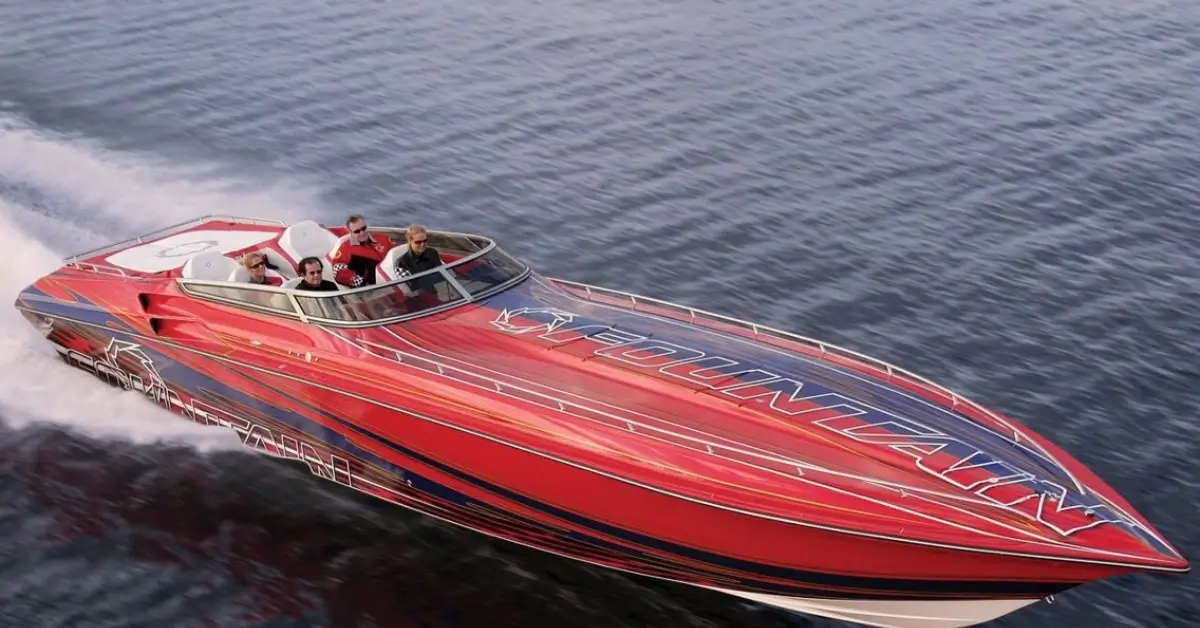How does a jet boat work? It’s a question that many people have asked themselves, and for good reason. Jet boats are a popular choice for thrill-seekers and water sports enthusiasts alike, but understanding how they work can be a bit of a mystery.
At its core, a jet boat is a watercraft that uses a jet engine to propel itself through the water. Unlike traditional boats that use a propeller to generate thrust, a jet boat uses a jet of water to create forward motion. This unique propulsion system allows jet boats to navigate shallow waters and perform impressive maneuvers that other boats simply can’t.
But how does it all work? In this article, we’ll explore the inner workings of a jet boat and break down the science behind its impressive performance. So, buckle up and get ready to learn how a jet boat works!
What Is a Jet Boat
Jet boats are a type of watercraft that use a jet propulsion system to move through the water. Unlike traditional boats that use a propeller to move forward, jet boats use an impeller to draw water into the boat and then expel it out through a nozzle at the back of the boat. This creates a high-pressure stream of water that propels the boat forward.
Jet boats are designed to be fast and maneuverable, making them ideal for a variety of water activities, such as racing, fishing, and recreational boating. They are also popular for use in shallow water, as their shallow draft allows them to navigate in areas where traditional boats may not be able to go.
Jet boats come in a variety of sizes and capacities, ranging from small personal watercraft to large vessels that can accommodate multiple passengers. Some models also come equipped with amenities such as seating, storage compartments, and entertainment systems.
Jet boats are a unique and exciting way to experience the water, combining speed, maneuverability, and versatility in a single watercraft. In this article, you will find all the information regarding the Question: How does a Jet Boat work?
How Does A Jet Boat Work

Have you ever wondered how a jet boat works? If so, you’ve come to the right place! In this section, we’ll explore the basics of how a jet boat works, including its engine and propulsion system, jet unit and water intake, steering and control, and propellers and nozzles.
Engine and Propulsion System
A jet boat is powered by a jet propulsion system, which uses a high-pressure jet of water to propel the boat through the water. The engine of a jet boat is similar to that of a traditional boat, but instead of a propeller, it uses a jet pump to create thrust. The jet pump is essentially a water pump that draws water into the boat and then forces it out at high speeds through a nozzle, creating forward motion.
Jet Unit and Water Intake
The jet unit of a jet boat consists of the jet pump, nozzle, and water intake. The water intake is located at the bottom of the boat, and it draws water into the jet pump. The jet pump then forces the water out through the nozzle, creating thrust and propelling the boat forward.
Steering and Control
Steering and control of a jet boat are achieved through the use of a steering wheel and throttle. The steering wheel is used to control the direction of the boat, while the throttle controls the speed. The direction of the boat is determined by the angle of the nozzle, which can be adjusted using the steering wheel.
Propellers and Nozzles
Unlike traditional boats, jet boats do not have propellers. Instead, they use a nozzle to create thrust. The nozzle is located at the back of the boat and can be adjusted to control the direction of the water jet. The nozzle is connected to an impeller, which is responsible for drawing water into the jet pump.
Overall, jet boats are known for their maneuverability and agility on the water. They are capable of reaching high speeds and can even travel in reverse. Additionally, because they do not have a propeller, they create less wake and are safer for swimmers and other watercraft.
Types of Jet Boats

Jetboats come in different types and are designed for different purposes. In this section, we will discuss the most common types of jet boats.
Inboard and Outboard Jet Boats
The two main types of jet boats are inboard and outboard jet boats. Inboard jet boats have the engine mounted inside the boat, while outboard jet boats have the engine mounted on the outside of the boat.
Inboard jet boats are typically more powerful than outboard jet boats, but they are also more expensive. Outboard jet boats are more affordable and easier to maintain, but they are not as powerful as inboard jet boats.
Racing and Recreation Jet Boats
Jetboats can be used for racing or recreation. Racing jet boats are designed for speed and agility, with powerful engines and lightweight construction. They are popular in competitions such as the Jet Boat World Championships.
Recreation jet boats, on the other hand, are designed for leisure activities such as skiing, wakeboarding, and tubing. They are usually larger and more comfortable than racing jet boats.
Fishing and Rescue Jet Boats
Jetboats can also be used for fishing and rescue operations. Fishing jet boats are designed for stability and maneuverability, with features such as fishing rod holders and live wells. They are ideal for navigating shallow waters and reaching remote fishing spots.
Rescue jet boats are designed for search and rescue operations, with features such as rescue platforms and emergency lights. They are used by coast guards, fire departments, and other emergency services.
In summary, jet boats come in different types and are designed for different purposes. Inboard and outboard jet boats are the two main types, with inboard jet boats being more powerful and expensive than outboard jet boats.
Racing and recreation jet boats are designed for speed and leisure activities, while fishing and rescue jet boats are designed for stability and maneuverability.
Advantages of Jet Boats

Jet boats have several advantages over other types of boats. In this section, we will discuss some of the most important advantages of jet boats and afterward, You will have a satisfactory answer of how does a Jet Boat works.
Performance and Efficiency
Jet boats are known for their high speeds and efficient performance. The water jet engine used in a jet boat provides excellent acceleration and top speed. The engine is also very fuel-efficient, which means that you can travel long distances without having to refuel frequently.
In addition, the lack of a drive shaft or propeller means that there is less drag on the boat, which further improves its performance and efficiency.
Maneuverability and Agility
Jet boats are very maneuverable and agile, making them ideal for use in shallow waters and tight spaces. The water jet engine allows the boat to turn quickly and sharply, which is essential for navigating through narrow channels and around obstacles.
Additionally, the lack of a propeller means that there is less risk of damage to the boat or injury to swimmers in the water.
Comfort and Versatility
Jet boats are designed with passenger comfort in mind. They typically have comfortable seating and plenty of room for passengers to move around. Additionally, jet boats are very versatile and can be used for a variety of activities, including water skiing, wakeboarding, fishing, and cruising.
They can also be used in a wide range of water conditions, from calm lakes to choppy seas. Overall, jet boats offer a unique and exciting boating experience. Their performance, maneuverability, and versatility make them an excellent choice for anyone looking for a fast, agile, and comfortable boat that can handle a variety of water conditions.
Disadvantages of Jet Boats

Jet boats are a popular choice for water sports enthusiasts, but they’re not without their drawbacks. While they offer impressive speed and maneuverability, there are some disadvantages of jet boats that are worth considering before making a purchase.
In the following, we’ll take a closer look at the downsides of jet boats and explore some of the challenges that come with owning one.
Noise and Fuel Consumption
Jet boats can be quite loud, especially at high speeds. This can be a problem if you plan on using your boat in areas where noise is restricted, such as in residential areas or near wildlife habitats. Additionally, jet boats tend to consume more fuel than other types of boats, which can be expensive over time.
Maintenance and Cost
Jet boats require regular maintenance to keep them running smoothly. This can be time-consuming and expensive, especially if you’re not mechanically inclined. Additionally, jet boats can be more expensive to purchase than other types of boats, which can be a barrier for some buyers.
Handling in Rough Water
While jet boats are great for navigating shallow waters and tight spaces, they can be less stable in rough water. The jet propulsion system creates less drag than a traditional propeller, making it more difficult to control the boat in choppy conditions.
Overall, jet boats are an excellent choice for those who value speed, maneuverability, and the ability to navigate shallow waters. However, they do have some drawbacks that should be considered before making a purchase.
If you’re willing to put in the time and money for maintenance and can handle the noise and fuel consumption, a jet boat may be the perfect choice for you.
Our Opinion on Jet Boats

At the end of the day, jet boats are a great choice for those who love speed and adventure on the water. They are easy to operate and require little maintenance, making them popular among boaters.
One of the biggest advantages of jet boats is their ability to travel in shallow water, which is perfect for exploring rivers and lakes. They are also very fast, which can be a thrill for those who love speed. Additionally, jet boats are easy to maneuver, which makes them a great choice for beginners.
On the downside, jet boats can be quite noisy, which can be a nuisance for those who prefer a quieter boating experience. They can also be more expensive than other types of boats, which can be a deterrent for some buyers. Additionally, jet boats can be less fuel-efficient than other types of boats, which can add to the cost of ownership.
Overall, we believe that jet boats are a great choice for those who love speed and adventure on the water. They are easy to operate, require little maintenance, and are perfect for exploring shallow waters. However, they do have their drawbacks, such as the noise level and the higher cost of ownership.
FAQ – How Does a Jet Boat Work
We hope this FAQ section has shed some light on the inner workings of jet boats and provided helpful insights into how they work. Now You should always have the best answer if someone asks you: “How Does a Jet Boat Work?”
What makes a Boat a Jet Boat?
A jet boat is a type of watercraft that uses a jet of water to propel itself forward instead of a traditional propeller. The jet of water is created by drawing water into the boat through an intake and forcing it out through a nozzle at the stern of the boat.
This design allows jet boats to operate in shallow water and provides them with exceptional maneuverability.
How Does a Jet Boat work in the Ocean?
Jet boats can be used in the ocean but are better suited for calmer waters. The design of a jet boat makes it more susceptible to damage from rough waves and saltwater corrosion.
Additionally, the lack of a propeller means jet boats may struggle to maintain speed in strong ocean currents.
What are the disadvantages of a jet boat?
While jet boats have many advantages, they also have a few disadvantages. One major disadvantage is that they are less fuel-efficient than traditional propeller-driven boats.
Additionally, the high-pressure jet of water created by the boat’s propulsion system can be dangerous to swimmers and marine life. Finally, jet boats are often more expensive to purchase and maintain than traditional boats.
How does a Jet Boat Work with a propulsion?
Jet propulsion works by drawing water into the boat through an intake and then forcing it out through a nozzle at the stern of the boat. This creates a high-pressure jet of water that propels the boat forward.
The direction of the jet can be controlled by a nozzle that can be rotated to steer the boat. Jet propulsion is often used on boats that need to operate in shallow water or in areas with a lot of debris, as the lack of a propeller reduces the risk of damage.
What do You think about Jet Boats? Let us know in the comments!





